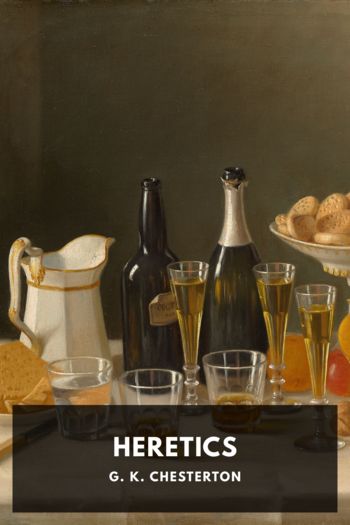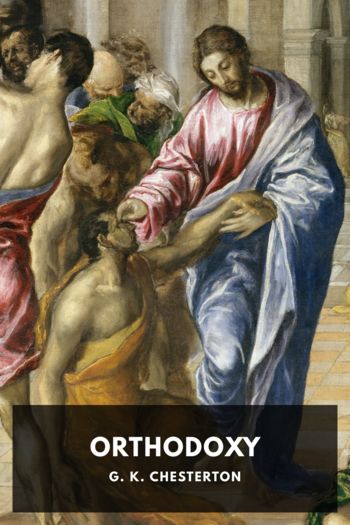Heretics by G. K. Chesterton (best way to read e books TXT) 📕

- Author: G. K. Chesterton
Book online «Heretics by G. K. Chesterton (best way to read e books TXT) 📕». Author G. K. Chesterton
I quote this passage with a particular pleasure, because Mr. McCabe certainly cannot put too strongly the degree to which I give him and his school credit for their complete sincerity and responsibility of philosophical attitude. I am quite certain that they mean every word they say. I also mean every word I say. But why is it that Mr. McCabe has some sort of mysterious hesitation about admitting that I mean every word I say; why is it that he is not quite as certain of my mental responsibility as I am of his mental responsibility? If we attempt to answer the question directly and well, we shall, I think, have come to the root of the matter by the shortest cut.
Mr. McCabe thinks that I am not serious but only funny, because Mr. McCabe thinks that funny is the opposite of serious. Funny is the opposite of not funny, and of nothing else. The question of whether a man expresses himself in a grotesque or laughable phraseology, or in a stately and restrained phraseology, is not a question of motive or of moral state, it is a question of instinctive language and self-expression. Whether a man chooses to tell the truth in long sentences or short jokes is a problem analogous to whether he chooses to tell the truth in French or German. Whether a man preaches his gospel grotesquely or gravely is merely like the question of whether he preaches it in prose or verse. The question of whether Swift was funny in his irony is quite another sort of question to the question of whether Swift was serious in his pessimism. Surely even Mr. McCabe would not maintain that the more funny “Gulliver” is in its method the less it can be sincere in its object. The truth is, as I have said, that in this sense the two qualities of fun and seriousness have nothing whatever to do with each other, they are no more comparable than black and triangular. Mr. Bernard Shaw is funny and sincere. Mr. George Robey is funny and not sincere. Mr. McCabe is sincere and not funny. The average Cabinet Minister is not sincere and not funny.
In short, Mr. McCabe is under the influence of a primary fallacy which I have found very common in men of the clerical type. Numbers of clergymen have from time to time reproached me for making jokes about religion; and they have almost always invoked the authority of that very sensible commandment which says, “Thou shalt not take the name of the Lord thy God in vain.” Of course, I pointed out that I was not in any conceivable sense taking the name in vain. To take a thing and make a joke out of it is not to take it in vain. It is, on the contrary, to take it and use it for an uncommonly good object. To use a thing in vain means to use it without use. But a joke may be exceedingly useful; it may contain the whole earthly sense, not to mention the whole heavenly sense, of a situation. And those who find in the Bible the commandment can find in the Bible any number of the jokes. In the same book in which God’s name is fenced from being taken in vain, God himself overwhelms Job with a torrent of terrible levities. The same book which says that God’s name must not be taken vainly, talks easily and carelessly about God laughing and God winking. Evidently it is not here that we have to look for genuine examples of what is meant by a vain use of the name. And it is not very difficult to see where we have really to look for it. The people (as I tactfully pointed out to them) who really take the name of the Lord in vain are the clergymen themselves. The thing which is fundamentally and really frivolous is not a careless joke. The thing which is fundamentally and really frivolous is a careless solemnity. If Mr. McCabe really wishes to know what sort of guarantee of reality and solidity is afforded by the mere act of what is called talking seriously, let him spend a happy Sunday in going the round of the pulpits. Or, better still, let him drop in at the House of Commons or the House of Lords. Even Mr. McCabe would admit that these men are solemn—more solemn than I am. And even Mr. McCabe, I think, would admit that these men are frivolous—more frivolous than I am. Why should Mr. McCabe be so eloquent about the danger arising from fantastic and paradoxical writers? Why should he be so ardent in desiring grave and verbose writers? There are not so very many fantastic and paradoxical writers. But there are a gigantic number of grave





Comments (0)